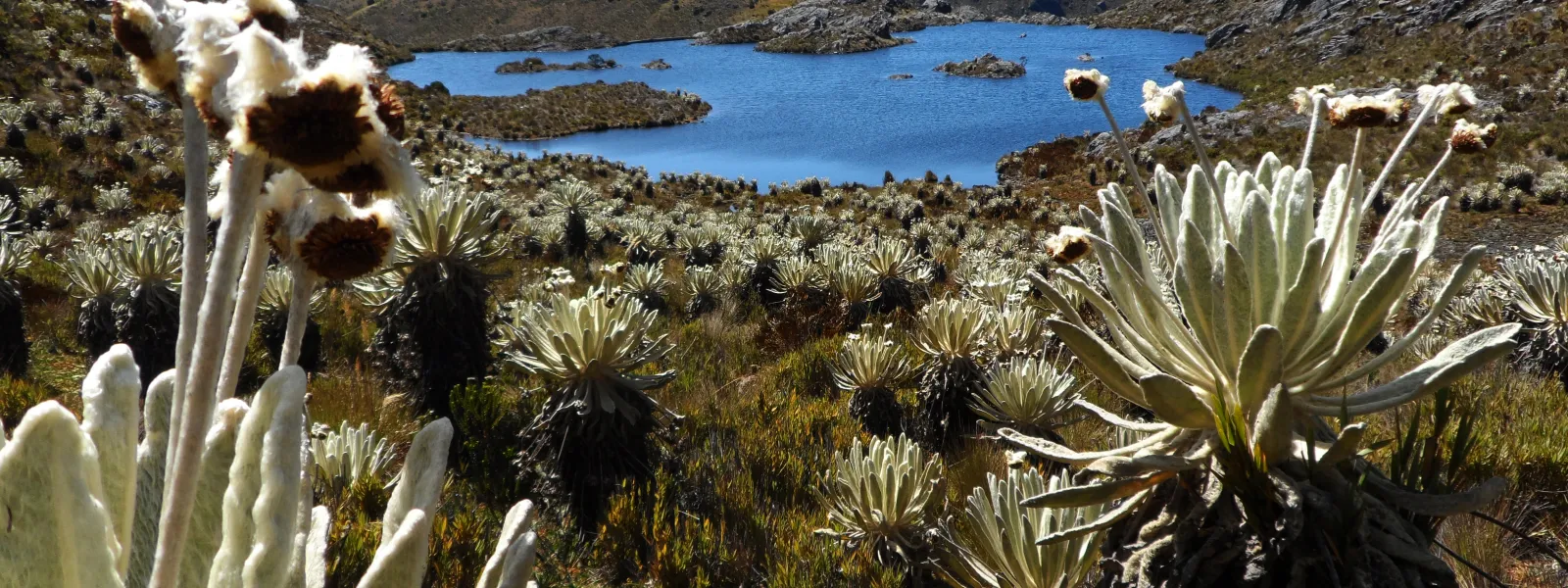
Project
Photo: Alberto Peña KayProtecting the Santurban Páramo from mining's damages
In the Andean region, high-altitude forests and wetlands called páramos capture water from fog and supply it to lowlands. In Colombia, nearly two million people rely on the Santurbán páramo for their freshwater supply.
Healthy páramos also capture large amounts of carbon, mitigating climate change, and provide refuge for hundreds of threatened species, including the iconic spectacled bear.
The land in and around the Santurbán páramo contains gold and other minerals. A Canadian corporation, Eco Oro minerals, wants to build a gold mine that would leak large amounts of cyanide and arsenic into the water coming from the páramo.
AIDA’s advocacy helped to convince the Colombian government to:
- Deny an environmental license for the Angostura mine in May 2011.
- Protect, in 2013, 76 percent of the Santurbán páramo from industrial activities—a much larger percentage than originally proposed
Together with our partners, AIDA advocated for the World Bank's divestment from the Angostura mining project, which we achieved in December 2016.
We also supported litigation that led Colombia’s highest court to reaffirm in February 2016 that mining in páramos is prohibited.
However, 24 percent of the Santurbán remains unprotected because it was not officially designated a páramo during the government's delimitation process, which was invalidated by a court system in November 2017 due to failure to consult with affected communities.
The government must now realize a new delimitation process in consultation with residents of the area. Meanwhile, the threats to Santurbán continue, with Eco Oro still angling to build its mine and another mining project seeking establishment nearby.
Partners:
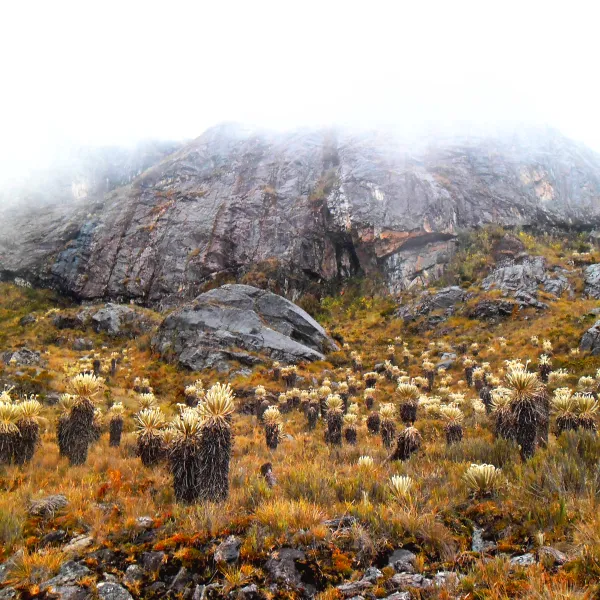
Related projects
Latest News
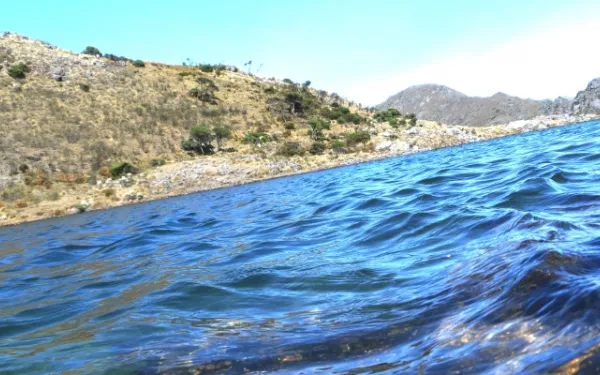
The hidden mine that threatens Colombia’s water
For me, a living thing like water can never be replaced by a non-living thing like gold. Gold should never be worth more than the water that gives us life. While those who defend mining often argue for it by saying that all human activity causes impacts, that line of thinking fails to address the underlying problem. When will we start recycling instead of extracting new resources? When will we stop assigning value to something as scarce but futile as gold? When will we treat the natural environments on which we depend with the respect they deserve? Taking these questions into account is critical not just for Colombia, my home, but also for all Latin American nations. In September I learned of the latest threat to one of our most important natural ecosystems, the Santurbán páramo. For centuries it has stood high in the Andes, keeping watch over the water of millions of us Colombians. For the last decade, mining companies have overlooked its ecological importance and angled to exploit the páramo’s lands for mineral wealth. For years, we’ve worked successfully to stop them. Now an international corporation has submitted the Environmental Impact Assessment for a new underground mining venture there. Located in the municipalities of Suratá and California, in northern Colombia, the mine would involve an intricate system of tunnels at least 2,000 meters long, 900 meters wide and 780 meters deep (only slightly shorter than the tallest building in the world, in Dubai). It would be built in two sections—traversing two river basins and two different municipalities—united by two immense 5,800-meter tunnels (nearly the expanse of the Colombian city of Bucaramanga from north to south). Previous attempts at mining near Santurbán have been rejected due to the potential damage they would cause to this unique natural environment, which serves as a key water source, a carbon sink, and shelters many endemic species of plants and animals. The risks of the project, examined The Company claims the new project will be different—no permanent accumulation of debris, no hazardous substances, no toxic sludge, and no mass infrastructure development. If this sounds too good to be true, that’s because it probably is. Could their venture really be different than the mega-mines that came before, or is it just dressed up that way? Let’s see: The company says the project’s only dump will be located near the mine and the waste will be dry. But dry waste in one site would require perpetual maintenance of the drainage network and other factors that, after the mine closes, it’s likely neither the company nor the State will be able to control. They say the project’s design would involve retro-filling all mining tunnels. But the impacts of drilling on the direction and volume of groundwater are unpredictable. It would be impossible to guarantee that the quality and quantity of water in the subsoil is conserved. They say that because the mine is technically outside the Santurbán páramo, it won’t affect the sensitive ecosystem. But technicalities aside, the mine would be only tens of meters below the páramo. Because it is an underground mine located in crystalline rocks, drilling could cross the multiple fractures through which water is transported to rivers, ravines and soils. They say the project will not use mercury or cyanide to obtain gold and other metals. By selling and exporting those metals to other companies in the form of ready-to-process concentrates, the company hopes to lessen the socio-ecological cost of the activity. But while it’s true Colombia may be spared the negative effects of toxic chemicals, that cost might be transferred to other countries, where the processing will take place. As Colombians we must begin to acknowledge the external impacts of our extractive industries, and stop ignoring our nation’s ecological footprint. The responsibility for the damages caused outside our borders by the mining that is done in Colombia is not only that of the buyer, but also of the Colombian State. Large-scale damages It’s important to understand that a hidden mine is not necessarily a better mine. What is done under the ground, especially on such a large scale, can do extensive damage to a much wider area. It’s a reality we must be keenly aware of in one of the most biodiverse countries in the world. We must think about the impact the mine would have on the quality and quantity of groundwater in the area, and the risks we’re taking by not having an adequate buffer zone for the páramo. Hiding the trash under the carpet does not mean you’ve cleaned, not in terms of the economy and certainly not in terms of mining. The protection of Santurbán, and that of other freshwater sources in Latin America, is one of the pillars of AIDA’s work. We’re proud to continue standing alongside our allies in Colombia and fighting to maintain the health of Santurbán.
Read more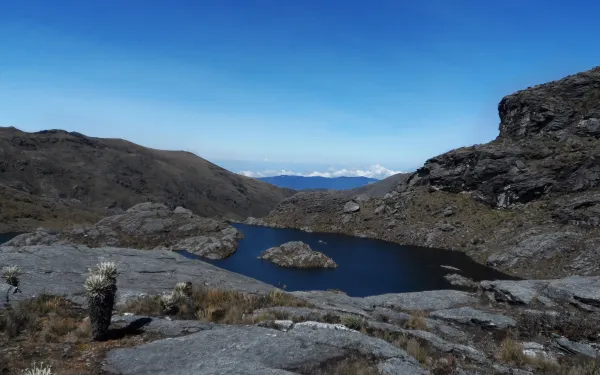
The Santurbán páramo: Closer to the sky
By Laura Yaniz The International Finance Corporation, part of the World Bank Group, said “No” to the Angostura mining project in Colombia’s Santurbán páramo. What does this decision mean? It’s one step closer to the protection of this priceless ecosytem. In Santurbán, the rocks become guardians of mirrors of water that reflect the sky. Frailejones stand watch over the remains of glaciers. Condors gaze down upon tiny visitors. The world sits closer to the sky. Santurbán is a páramo, an ecosystem only found high in the Andes Mountains. The Canadian company Eco Oro Mineral has set their sights on these lands because, as rich as they are in water, they are rich too in minerals. The IFC had invested in the company’s Angostura mining project but, at the end of 2016, they made the wise decision to withdraw that investment. It was an important victory in the ongoing fight to save Santurbán, the water source of millions of Colombians. But what exactly would be saved? And what is the allure of Santurbán? Alberto Peña Kay, a local hiker and photographer, speaks through the images he captures of the many reasons this unique ecosystem must be protected: Frailejones (espeletias) are endemic plants that, because of the extreme conditions of the high-Andean climate, have uniquely adapted to protect themselves from the cold, the high levels of UV radiation, and the lack of nutrients. Their succulent leaves absorb water from the clouds, which they then store in their trunk. Some of these plants grow just one centimeter a year. “When I first came to this páramo and photographed it, I knew I had to keep coming back. This place inspired my passion for photography.” “Many don’t see this place as I do; they look upon it with economic eyes, eyes set on mining and extraction.” “At our best, we see the potential here, and recognize that it’s something we can’t lose. There are so many reasons to conserve these lands.” Why? "First, it’s my department, the great Santander. Second, the biodiversity: here live icons like the condor, the puma and the frailejone. Third, this páramo supplies water to more than half of the people who live in Santander and Northern Santander.” "[In Santurbán], I realized I could get closer to the sky." Really, Santurbán speaks for itself. We must save this piece of heaven on Earth, it's well worth the fight!
Read more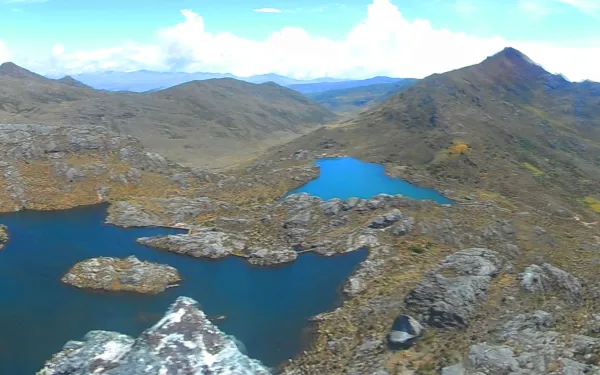
World Bank divests from Eco Oro Minerals and mining project in Colombian Páramo
In an important step for the protection of Colombia’s páramos, the International Finance Corporation (IFC) – the private lending arm of the World Bank – has decided to divest from Canadian mining company Eco Oro Minerals. The company’s Angostura gold mining project is located in the Santurbán Páramo, a protected ecosystem that provides water to millions of people. Bogota, Washington, Ottawa, Amsterdam. The International Finance Corporation (IFC), private lending arm of the World Bank Group, has decided to divest from Canadian company Eco Oro Minerals. The company’s Angostura mine is located in Colombia’s Santurbán Páramo, a protected high-altitude ecosystem that provides water to millions of people. Colombian law prohibits mining in páramos. "We applaud the Bank’s decision to side with the Committee for the Defense of Water and the Santurbán Páramo regarding the inviability of mining in the páramo," said Alix Mancilla, representative of the Committee. "We now call on the Colombian government to abstain from issuing environmental permits to any mining project which may affect Santurbán." "The IFC’s divestment is a serious political and financial blow to mining in the Santurbán páramo," said Carlos Lozano Acosta of the Interamerican Association for Environmental Defense (AIDA). "The Colombian government must now reflect on its lenient approach to large scale mining in páramos, which is illegal under national law." The IFC’s decision comes after a report issued by the Office of the Compliance Advisor Ombudsman (CAO), an independent accountability mechanism, which found that the IFC's investment did not adequately consider the environmental and social impacts of the project, breaching the financial institution's internal policies. The report was developed in response to a complaint the Committee filed before the CAO in 2012, with support from the international organizations included herein. "After intense public pressure, the IFC finally got the message and, by divesting, amplifies it further. The decision to divest strengthens the Colombian State’s ability to protect water and regulate in the public interest. We applaud this decision by the IFC, which will have an impact on Colombians everywhere," affirmed Carla Garcia Zendejas of the Center for International Environmental Law (CIEL). The IFC's decision occurs in the context of Eco Oro’s announcement that it has initiated international arbitration against Colombia, under the terms of the Canada-Colombia Free Trade Agreement at the International Centre for Settlement of Investment Disputes (ICSID), part of the World Bank. The company is filing the suit over the State’s measures to protect Colombia’s páramos. "Eco Oro Minerals' interest in Colombia is no longer about mining. Rather, it is about extorting a sovereign government for millions in taxpayer dollars and exerting pressure to weaken protections for water in Colombia. The IFC’s divestment not only extricates the Bank from a clear conflict of interest, but also highlights the presence of ill-advised mining projects in the Colombian páramo and the illegitimacy of the suit," added Garcia Zendejas of CIEL.
Read more